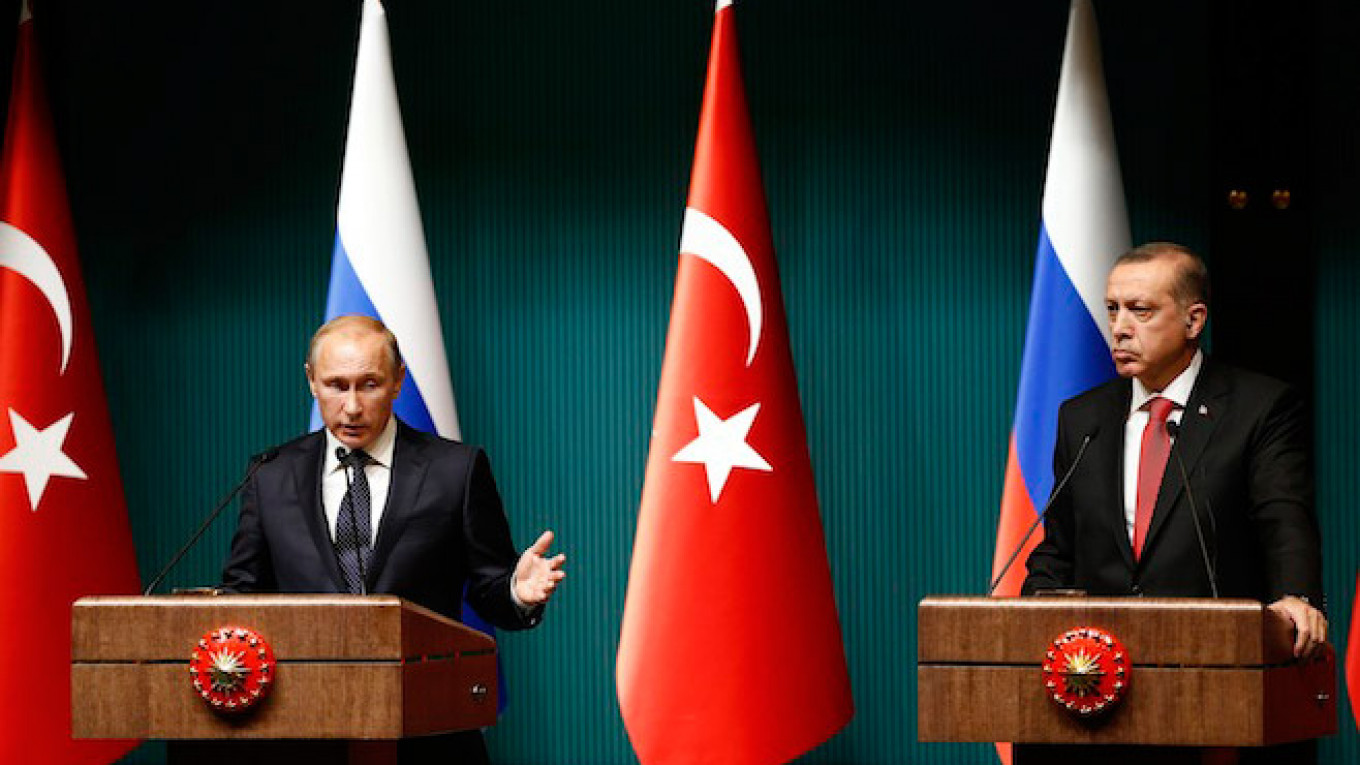Туркобандéровцы: Turkobanderites (really)
The last few weeks have been extremely fraught here in Russia, and fraught means media hysteria, and media hysteria means a rich harvest of newly coined words — horrible, ridiculous, and unbelievable.
A lot of it centers on Turkey, of course. We are very mad at Turkey for shooting down our fighter jet, which, according to every politician and state-paid journalist and all my neighbors, either strayed for a few seconds or didn't stray at all into Turkey's airspace. I get being angry about that. What I don't get is the sudden, vicious hatred for everything Turkish. Overnight we suddenly realized that we can't stand their beaches and don't trust their airplanes. They send us fly-infested oranges and poisoned tomatoes. Their cheese, so tasty just yesterday, is now inedible and bad for your health. And their mothers wear army boots. It's like sixth grade.
Language followed — or possibly led — the attacks. Internet became instantly filled with туркобандеровцы (Turkish Banderites, i.e., Ukrainian fascists). Some usage is ironic, of course: Пропагандисты Кремля придумали нового зловещего врага. Встречайте: Туркобандеровцы (The Kremlin propagandists dreamed up a new sworn enemy. Meet the Turkish Banderites.) And some is joking: А как теперь правильно: жидотурки или туркобандеровцы? (What's the proper thing to call them — Jew-Turks or Turk Banderites?) But some jokey usage is derogatory to Turks — and Ukrainians, like this reimaging of a famous Ilya Repin painting: Укробандеровцы пишут письмо туркобандеровцам с просьбой сбить российский Су-24 (The Ukie Banderites write a letter to the Turkie Banderites asking them to shoot down the Russian Su-24.) And yet other usage is apparently serious: Туркобандеровцы и их главарь — американский сукин сын (Turkish Banderites and their ringleader — the American son of a bitch.)
The Turkish leader's name also quickly became fodder for angry wordsmiths: Эрдоганить — свежий глагол в русском языке. Означает прикидываться шлангом после того, как наделал крупных пакостей. ("To erdogan" is a freshly minted verb in the Russian language which means to try to fade into the woodwork after doing something rotten.) Other dark wits provide different definitions that are far more damning, mostly involving удар в спину (a knife in the back).
Thanks to the wonders of Russian word formation, nouns have appeared from the verb: эрдогадости (erdonastiness) or эрдогад (erdorat). The latter has its own verb, defined as a military term: Поэрдогадить: полетать на F- 16 над территорией Сирии (To pull an erdorat: to fly an F-16 over Syrian territory.)
These expressions are jokes, of course, but nasty jokes — a way to dehumanize the new enemy. But one outraged blogger writes from the would-be future: Был такой президент — Эрдоган. Остался от него только ругательный термин — "эрдоганить" (There once was a president named Erdogan. But all that was left of him was the derogatory term "to erdogan.")
Meanwhile, the mainstream media remembered that Fyodor Dostoevsky wrote passionately about the 19th century Russo-Turkish war, and he is quoted under headlines like: Шесть веков имперского противостояния (Six Centuries of an Imperial Confrontation).
And as the politicians and pundits fight it out on high, average folks are trying to figure out where they might take their next vacation. Когда было принято решение ограничить полеты в Египет, Турция стала рассматриваться как возможное курортозамещение (When the decision was made to limit flight to Egypt, Turkey was regarded as a possible resort substitution.)
Where's the next resort substitution? Or to be more exact: who don't we hate?
Michele A. Berdy, a Moscow-based translator and interpreter, is author of "The Russian Word's Worth" (Glas), a collection of her columns.
A Message from The Moscow Times:
Dear readers,
We are facing unprecedented challenges. Russia's Prosecutor General's Office has designated The Moscow Times as an "undesirable" organization, criminalizing our work and putting our staff at risk of prosecution. This follows our earlier unjust labeling as a "foreign agent."
These actions are direct attempts to silence independent journalism in Russia. The authorities claim our work "discredits the decisions of the Russian leadership." We see things differently: we strive to provide accurate, unbiased reporting on Russia.
We, the journalists of The Moscow Times, refuse to be silenced. But to continue our work, we need your help.
Your support, no matter how small, makes a world of difference. If you can, please support us monthly starting from just $2. It's quick to set up, and every contribution makes a significant impact.
By supporting The Moscow Times, you're defending open, independent journalism in the face of repression. Thank you for standing with us.
Remind me later.








